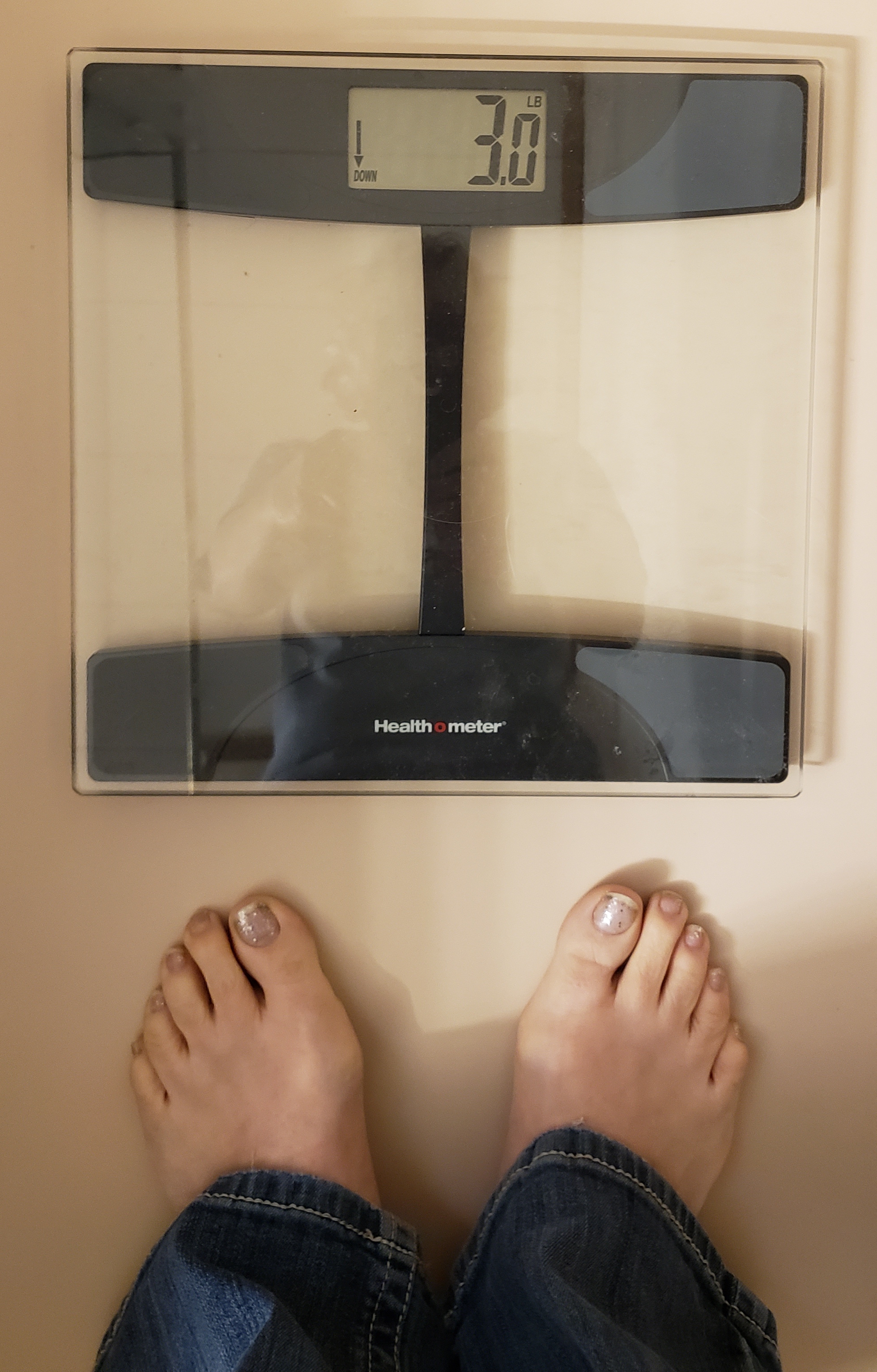If you intend to live a healthy and fit life, you have to make healthier choices every day. Today, I am going to share five of the most impactful things you can do every day to eat healthier and lose excess weight.
I am not going to lie. I have packed on some pounds over the holidays. Actually it started at the end of the summer at our last family barbecue of the year. At first it was five pounds and I wasn’t too worried but it didn’t take long and it was ten pounds. There were birthday celebrations and church pot lucks and soon my entire healthy eating plan was derailed.
It’s almost the new year. Have you stepped on the scale yet? Eating healthy isn’t all about your weight but if you are carrying around extra pounds it can certainly impact your health. So let’s start there.
Let’s start with the intention to maintain a healthy weight.
What is is my healthy weight?
To reach and maintain a healthy weight you have to treat eating as the process to fuel your body. You must quit thinking of eating as a social activity and food as an emotional suppressant.
There was a time when I spent more time figuring out what my horse’s daily nutritional intake would be than my own. We researched how much grain, how much hay, and how much water each horse needed each day based on it’s weight and activity level. We weighed out grain and hay based on the ideal weight they should weigh based on their height and build.
The Henneke Scale describes a horse’s body condition. The ideal is moderate or 5 on a scale of 1-9. My veterinarian always recommended aiming for a 4 or 5 but a 6 was okay. I preferred aiming for 6 because I also had more issues helping a horse gain weight than lose it. A 6 is a healthy, moderately fleshy horse. The vet preferred a thinner horse to a heavier horse.
The BMI or Body Mass Index is like the Henneke Scale for humans. It is a weight range that helps you target a healthy weight. It’s the closest scale we have to a body conditioning scale for human bodies. Your BMI is calculated by using your height and weight. The BMI will give you an ideal where you are now and a healthy weight range for you to maintain.
It helps to have a target weight in mind so you know if what you are doing daily is helping you move closer or farther away from your healthy weight goals. Calculate your ideal weight using one of the following formulas: Broca, Devine, Robinson, Miller, Hamwi, or Lemmons or find your ideal weight range using the BMI.
What are Five Things you can do every day to reach and maintain your healthy weight?
I am not going to over complicate this with a lot of special diets or miracle formulas or fasting and detox routines. It isn’t that complicated. To reach your ideal healthy weight you must consume less calories than you burn. That is it. But now that you’ve decided that food is fuel for your body; you must make healthier choices within your calorie limits to give your body the nutrition it needs without the crap it doesn’t need.
You are going to do that by:
- Planning every calorie you are going to consume each day
- Snacking nutritiously; yes, you get to snack, too!
- Scheduling your food intake throughout the day
- Prepping for food you need to eat away from home
- Keeping a journal of every calorie you consume until you reach and maintain your healthy weight target
How many calories should I consume every day?
Use an online calorie counter to determine how many calories you should consume each day to maintain your ideal weight and then subtract 500 calories. This is your target daily calorie consumption. If your BMI is 30 or greater, use your current weight to determine your calorie intake. As you lose weight and reach a BMI between 25-29, you can adjust your calorie intake based on your ideal weight. Ideally, you will be losing 1 to 2 pounds per week.
How do I plan what type of calories to consume each day?
To get the most impact for the calories you do consume it is going to take a little planning. Get rid of empty calories like sugar and highly processed foods. Just dump them in the trash right now, they don’t fuel your body and act more like toxins to your good health.
Let’s say you calculated you should consume 1200 calories each day to reach your target weight losing 1 pound per week. Spread these calories throughout the day and then plan your meals around them.
An easy plan includes 200 calories for breakfast, 200 c. for lunch, and 400 c. for dinner that leaves 400 calories for snacking nutritiously in between. You might choose four 100 calorie snacks or two 200 calorie snacks. You can look at the food you already eat and measure their calories or find new ones that meet your new goals.
This is what you will eat every day. Period.
What are some nutritious snacks I can have while losing weight?
The nutritious snacks you eat while losing weight are the same ones you are going to eat while maintaining your fit and healthy lifestyle. The goal is to experiment with whole food snacks until you find the ones that you love and that will love you back. For the most part you are cutting out simple sugars and highly processed foods. The empty, sugary calories of soda is going to have to go.
Most sweets are going to be replaced with the natural goodness of whole fruits with a little bit of dark chocolate. I plan to share a lot of recipes in future posts but a quick yummy snack you can have right not is your favorite fruit; 1/2 a banana or strawberries or blueberries dipped in dark chocolate. Melt your dark chocolate wafers in the microwave for 30 seconds, stir, then heat 15 seconds more and stir. Coat your fruit in chocolate and enjoy.
Imitation crab meat is another low calorie choice you can add to your holiday buffet or snack on during the day. Avoid the cocktail sauce or butter though and enjoy the flavor already in that fish. Be aware it is higher in salt than other snacks so it’s not a snack you want to eat every day.
What time should I eat to lose weight?
Although spreading your calories out throughout the day can help you stave off hunger pains, you can eat any time of day before 6pm. Eating all your calories before 6pm has shown to help eliminate evening cravings which account for the majority of cravings people have throughout the day.
You can teach your body that you are done eating by 6pm in a few days. Clean the kitchen after your last meal and put all the food and dishes away. Turn off the kitchen lights and develop an evening routine that does not include mindlessly eating in front of the tv. You can develop a taste for a cup of hot herbal tea or drink glass of water if you need something in the evening. Eventually your body will be on board with whatever you choose to do consistently.
How can I limit calories away from home?
If you have to eat while away from home, whether traveling or just out chauffeuring the kids around town, avoid the drive through at all costs, especially with the kids in the car. While traveling stop in a grocery store for a snack, instead of a gas station. You can find prepped fruits and veggies in the produce aisle or grapes and cheeses. For lunch, you can find already packaged up salads or ingredients to make your own wraps.
While chauffeuring hungry kids from one activity to another, carry a cooler in the car filled with whole fruits, veggies, and maybe even some crab meat. They can reach in and grab a snack as you transport them to their next activity. Make list in your food journal of the snacks and quick grocery store meals you have discovered that you and your family enjoy. Use this list when prepping for a road trip or a busy evening in the car.
When you are eating out, whether at a restaurant or at a holiday party buffet at a friend’s house, remember it is not about what looks good on the buffet. Instead of asking yourself, “What looks good?,” ask yourself, “What looks healthy?” Ask for a to-go box at the same time you order your food at a restaurant. When the food comes, leave only your allotted portion on your plate and take the rest home for tomorrow’s yummy lunch. At the buffet, take only one plate with the best food for your body in the right portion and then get a glass of water or warm beverage to hold while engaging with other guests who are munching away.
How does tracking your food help you lose weight?
Keeping a food journal and writing down every calorie you consume packs one powerful punch to your weight loss journey. It’s like tracking your spending helps you save money and create better spending habits. When you track your food consumption, you can easily tell what is helping you toward your target weight goal and what is not.
If you are on stuck at a plateau or gaining weight, you can look over your food journal and see which habits you’ve picked up that are detracting from your goal. When things are on track and you are losing 1 to 2 pounds per week, you can see what things are working for you.
Even if you are losing weight as planned, looking over your food journal can show you areas that you can improve your nutritional intake. Say your 100 calorie snack is half a candy bar and you decide you could swap that out for an apple to improve the nutritional content of those 100 calories. It is easy to see where your good fuel intake can be improved as well as pat yourself on the back for the good choices you are making.
Make sure you record everything you consume including liquids. Pop, alcohol, or water all count to give you a good picture of your overall fuel consumption health.
How do you maintain a healthy weight?
I remember my parents used to keep a book in their car that recorded every gas fill, every oil change, and all the fluids they added to their car. Not sure what that was for but I will note that they didn’t do that for their body. There is no book showing the good or the bad fuel they put in their bodies over the year.
What is really more important than what you put in your body? Why are people more obsessed with what they put in their car than what they put in their body?
In order to maintain a healthy weight, you have to take charge of what you consume. You must plan your calorie intake, make what you eat count nutritiously, set up an eating plan that you can stick to, prep for circumstances that tempt you to over eat or eat badly, and keep track of what you eat until you have developed a consistently healthy daily fuel intake.
It’s not that complicated; you are what you consume.

